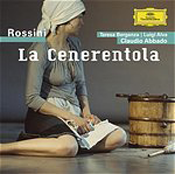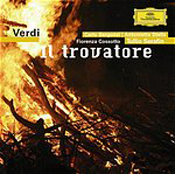Recently in Recordings
The Sixteen continues its exploration of Henry Purcell’s Welcome Songs for Charles II. As with Robert King’s pioneering Purcell series begun over thirty years ago for Hyperion, Harry Christophers is recording two Welcome Songs per disc.
In February this year, Albanian soprano Ermonela Jaho made a highly lauded debut recital at Wigmore Hall - a concert which both celebrated Opera Rara’s 50th anniversary and honoured the career of the Italian soprano Rosina Storchio (1872-1945), the star of verismo who created the title roles in Leoncavallo’s La bohème and Zazà, Mascagni’s Lodoletta and Puccini’s Madama Butterfly.
Collapsology. Or, perhaps we should use the French word ‘Collapsologie’ because this is a transdisciplinary idea pretty much advocated by a series of French theorists - and apparently, mostly French theorists. It in essence focuses on the imminent collapse of modern society and all its layers - a series of escalating crises on a global scale: environmental, economic, geopolitical, governmental; the list is extensive.
Amongst an avalanche of new Mahler recordings appearing at the moment (Das Lied von der Erde seems to be the most favoured, with three) this 1991 Mahler Second from the 2nd Kassel MahlerFest is one of the more interesting releases.
If there is one myth, it seems believed by some people today, that probably needs shattering it is that post-war recordings or performances of Wagner operas were always of exceptional quality. This 1949 Hamburg Tristan und Isolde is one of those recordings - though quite who is to blame for its many problems takes quite some unearthing.
The voices of six women composers are celebrated by baritone Jeremy Huw Williams and soprano Yunah Lee on this characteristically ambitious and valuable release by Lontano Records Ltd (Lorelt).
As Paul Spicer, conductor of the Royal Birmingham Conservatoire Chamber Choir, observes, the worship of the Blessed Virgin Mary is as ‘old as Christianity itself’, and programmes devoted to settings of texts which venerate the Virgin Mary are commonplace.
Ethel Smyth’s last large-scale work, written in 1930 by the then 72-year-old composer who was increasingly afflicted and depressed by her worsening deafness, was The Prison – a ‘symphony’ for soprano and bass-baritone soloists, chorus and orchestra.
‘Hamilton Harty is Irish to the core, but he is not a musical nationalist.’
‘After silence, that which comes closest to expressing the inexpressible is music.’ Aldous Huxley’s words have inspired VOCES8’s new disc, After Silence, a ‘double album in four chapters’ which marks the ensemble’s 15th anniversary.
A song-cycle is a narrative, a journey, not necessarily literal or linear, but one which carries performer and listener through time and across an emotional terrain. Through complement and contrast, poetry and music crystallise diverse sentiments and somehow cohere variability into an aesthetic unity.
One of the nicest things about being lucky enough to enjoy opera, music and theatre, week in week out, in London’s fringe theatres, music conservatoires, and international concert halls and opera houses, is the opportunity to encounter striking performances by young talented musicians and then watch with pleasure as they fulfil those sparks of promise.
“It’s forbidden, and where’s the art in that?”
Dublin-born John F. Larchet (1884-1967) might well be described as the father of post-Independence Irish music, given the immense influenced that he had upon Irish musical life during the first half of the 20th century - as a composer, musician, administrator and teacher.
The English Civil War is raging. The daughter of a Puritan aristocrat has fallen in love with the son of a Royalist supporter of the House of Stuart. Will love triumph over political expediency and religious dogma?
Beethoven Symphony no 9 (the Choral Symphony) in D minor, Op. 125, and the Choral Fantasy in C minor, Op. 80 with soloist Kristian Bezuidenhout, Pablo Heras-Casado conducting the Freiburger Barockorchester, new from Harmonia Mundi.
A Louise Brooks look-a-like, in bobbed black wig and floor-sweeping leather trench-coat, cheeks purple-rouged and eyes shadowed in black, Barbara Hannigan issues taut gestures which elicit fire-cracker punch from the Mahler Chamber Orchestra.
‘Signor Piatti in a fantasia on themes from Beatrice di Tenda had also his triumph. Difficulties, declared to be insuperable, were vanquished by him with consummate skill and precision. He certainly is amazing, his tone magnificent, and his style excellent. His resources appear to be inexhaustible; and altogether for variety, it is the greatest specimen of violoncello playing that has been heard in this country.’
Baritone Roderick Williams seems to have been a pretty constant ‘companion’, on my laptop screen and through my stereo speakers, during the past few ‘lock-down’ months.
Melodramas can be a difficult genre for composers. Before Richard Strauss’s Enoch Arden the concept of the melodrama was its compact size – Weber’s Wolf’s Glen scene in Der Freischütz, Georg Benda’s Ariadne auf Naxos and Medea or even Leonore’s grave scene in Beethoven’s Fidelio.
Recordings

20 Jan 2008
Deutsche Grammophon budget opera sets
Repackaging older recordings having become the primary focus of a classical recording company's business, Deutsche Grammophon budgeted some funds for art direction for its budget series called "Opera House" (although that appellation only appears in a link found on the back inside cover of the sets' booklets).
The theme seems to be iconic imagery in realistic photographs. For the fine Claudio Abbado-led La Cenerentola, the cover features a young washerwoman with wooden bucket and straw broom. She looks sad - hasn't anyone noticed her short skirt and cleavage-exposing blouse? Thankfully no model had to risk her life by posing amid the flaming pile of sticks for the Il Trovatore set.
Well, if such artwork catches the eyes of potential customers, their ears will be further rewarded with the performances contained in these sets. Abbado's elegant Cenerentola stars Teresa Berganza, who can sing sadly with great sweetness. When her big moment comes at the end of the opera, Berganza marries solid technique to refined joy. The bravura excitement of Cecilia Bartoli may be missed by some, but the Bartoli set, to the extent it is still available, remains at full price. Neither Bartoli nor Berganza have star tenors for the role of Don Ramiro, which has been sung with such beauty by Juan-Diego Florez, among current tenors. Luigi Alva on this 1971 DG set, while displaying command of the idiom, lacks tonal beauty. Paolo Montarsolo blusters as Don Magnifico, a character not easy to take on a recording. Renato Capecchi's Dandini slithers in and out of ensembles with appropriate slickness. The London Symphony orchestra and Scottish Opera Chorus make up for any perceived lack of Italian warmth with precision and style.
 More than Italian warmth, fire burns through the Tullio Serafin Trovatore set. The cast listing in the booklet puts Ettore Bastianini's Conte di Luna first, and why not? His portrayal rages and aches with a passion that makes him much more than just the baritone villain. The "Il balen" alone makes this set precious, with gorgeous tone and supple, long-breathed lines. Sparks to light more than a few pyres fly when Bastianini meets the Azucena of Fiorenza Cossotto, near the start of her international career (the recording dates from 1962). Demonic in her low notes and fierce when she reaches high, she dominates the performance as only a truly great Azucena can.
More than Italian warmth, fire burns through the Tullio Serafin Trovatore set. The cast listing in the booklet puts Ettore Bastianini's Conte di Luna first, and why not? His portrayal rages and aches with a passion that makes him much more than just the baritone villain. The "Il balen" alone makes this set precious, with gorgeous tone and supple, long-breathed lines. Sparks to light more than a few pyres fly when Bastianini meets the Azucena of Fiorenza Cossotto, near the start of her international career (the recording dates from 1962). Demonic in her low notes and fierce when she reaches high, she dominates the performance as only a truly great Azucena can.
The ostensible leads both give worthy performances, if ultimately outshone by both the stars mentioned above in this recording, and by other singers in their roles on other versions. Antonietta Stella's lovely soprano sometimes threatens to spread at the end of long lines or high-flying passages. Ultimately her very feminine sound carries her through. Carlo Bergonzi gives a more bel canto reading of Manrico than is typical. The character is a troubadour, after all, and Bergonzi makes it clear that Manrico can sing quite beautifully. He does fire up the engines for "Di quella pira," with an understandable if amusing delay before firing off the climatic high note at the aria's end.
Serafin proves again his mastery of Verdi, and the chorus and orchestra of La Scala perform with their expected conviction. The overly bright recording, however, lacks any sense of dramatic space.
Both sets come with detailed track listings that include plot summaries of the action at key moments, in English, French and German. Your reviewer could find no word of a link to an online libretto in the booklet. So these sets can be best recommended to opera fans who already own sets with more complete packaging. Both offer ample musical reasons for adding them to any collection.
Chris Mullins

